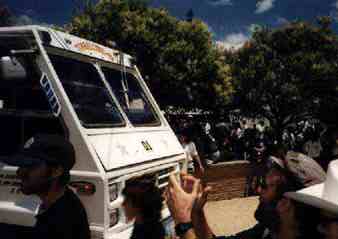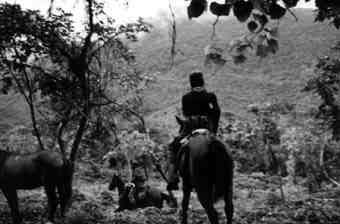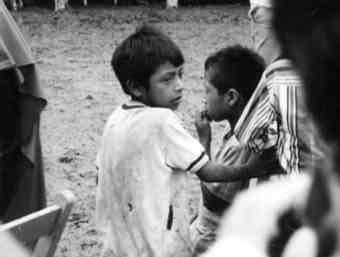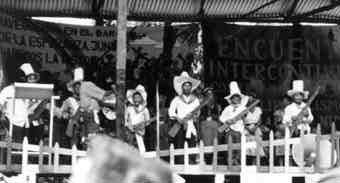I WAS AT THE ENCUENTRO. . . .
Massimo De Angelis (August 1996)
Part I . . . and I heard many complaints . . .
. . . "Viva la delegacion Italiana . . . VIVA!" pipiripipiripi-da-baaaaa. "Viva la delegacion Francesa . . . VIVA!" pipiripipiripi-da-baaaa. "Viva el primer encuentro en . . . contra del neoliberalismo . . . VIVA!" pipiripipiripi-da-baaaa . . .

I am telling you, it was a great welcoming at Oventic, one of the 5 Aguascalientes in Zapatista's territory, where the First Intergalactic Meeting against Neoliberalism and for Humanity was held. After a full day travelling on those crowded buses in which we sang, sweat, tried to sleep and faced the immigration police; after lining up to allow the masked Zapatistas to check our bags - I mean there were more than three thousands of us ! - we finally entered in that Aguascalientes, and walked down towards the stage between two long lines of Zapatistas and local indigenous cheering and clapping, and in our ears there were those carnivalesque marimbas repeated each time a new delegation was announced - 10, 20, 50, 100 and I don't know how many times . . .well it was just overwhelming!
I felt I was wanted. I felt it was going to be a meeting among human beings not afraid to be serious and laughing, to be concerned and dancing. I felt that we were going to talk about the horrors of neoliberalism and our struggles against it with dignity, facing Power with the strength of our desire to live. VIVA las Marimbas . . . VIVA! But wait I have heard even criticism about this welcoming. Someone said "it was staged". Can you believe it? Now I am telling you this because one of the things that upset me most about my week in Zapatista's territory is the quality of many criticisms I have heard.
Now take this one for example. The marimbas, and the music, and the two long lines of cheering indigenous "was staged!" Of course it was staged, so what?! How could have been otherwise? Would you have rather had an innocuous but "spontaneous": "hi mate, how're you doing?" by a passing indio after eight and more hours on a crowded bus? No, there was in many of us the easy criticism of those who fetishised spontaneity, those of us who have great difficulty to take responsibility and are threatened every times someone else takes it, those of us who childly shudder in front of the word "organisation". And not only that. There were also many of us who shook their head every times the word "order" came out. Those who were not trained in the Zapatista's meaning of the term, and there were many who did not know that "leading obeying" is the basic rule that the EZLN has adopted in relation to the community.

Take this example which occurred in Roberto Barrios, the poorest Aguascalientes where we held the economic mesa. The first night in the auditorium a masked Zapatista was introducing some cultural events - indigenous dancing, singing etc. Suddenly one in the public stood up and shouted: "wait, before going on I want to say that it is a shame that out there there are people including women and children under the rain, while here there is plenty of space". Like it was a co-ordinated operation, someone on the other side of the auditorium yelled to the public "come on, move up with the chairs so we let them in." After few confusing seconds in which people did not really know what to do, the masked Zapatista said at the microphone: "thanks for your interest, but we are in charge here and the orders are that the way it is now it's fine. Let's us proceed." In all this time, no one single body of the indigenous community that was leaning against the fence at the back of the auditorium under pouring rain did move of an inch. The day after a Zapatista's commander told the national delegates that the reason they (the community) decided to stay there was for our protection: the community was obeying its own order.
So here it is. Two small examples of lack of understanding and cultural shock. Do you want another? Take this one. The over-complained issue of the Zapatistas (and the communities) not interacting with the foreign guests. The Zapatistas example. As you probably know there were 5 tables (mesas) of work at the First Intergalactic Meeting against Neoliberalism and for Humanity. Each mesa then was divided up in four submesas. In each of these were attending two Zapatistas, with their traditional balaclavas. I heard that in some they were taking notes, in some they were yawning, in some they were standing still. At times some of the participants asked them a question. In all cases that I know of, they received no answer. A usual complaint was therefore about their lack of participation, that frustrated many who went to Chiapas with questions to them rather than with questions for themselves and an attitude to try to find some answers. The fact however is that the individual behind the mask is a representative. In Roberto Barrios one of the commander in his final speech at the plenary referred to some of the questions he received the day before in one of the mesa, and answered. He took an entire day to answer: could he have consulted others? did he want to talk for all and not for himself?

Furthermore, for many of the commanders this was a learning experience, like for many of us. After all we were a bunch of weirdoes, speaking weird words, often making little sense even to each other. Can we grant some time to the Zapatistas to "get to know us" before we jump into the request of the instant gratification of real-time interaction? the other question of the community. Some complained "we did not get to know the community"; "they were distant"; "we were two worlds", etc. etc. Well, do you want an easy solution. There it is: learn their language(s) and go to live with them. After all, they kept repeating that the Aguascalientes were everybody's home. As a second option, read the immense literature on indigenous culture. Or take the vulgar equalitarianism there was among us. Yes, those who defined "child exploitation" the passing around of children selling "frescos" or insistently asking you for the empty can of Coke (often as soon as you have opened it, that was really amusing). "Why Marcos did not pass around doing it?" Can you believe it?
Now look, there is a difference between equalitarianism and vulgar equalitarianism. Can you imagine a four-years old child going at the microphone holding a press conference with an international press often waiting for a phrase or word to use to attack the entire movement? The real equalitarian problem is whether the four-year old child is put in a condition to develop all his or her potentials and not whether at that age he or she can do what she can to contribute to the work of the community (a "work" that often seemed more as a play than work). Or the vulgar purism of those who complained that after all selling sodas was a commodity transaction. Thanks a lot. Don't you think that selling US or European radical publications in exchange for money is a commodity transaction that brings in money to the radical publisher which allows it to survive in a money-centred capitalist world? At times I was really shocked by the easiness with which denigrating comments were used on many aspects of our daily life in the Zapatista's territory.

Part II . . . but I think it was a historical meeting.
Yes, I think it was. Or at least we were in the act of crossing the twilight zone between two epochs. One of those moments in which it is clear that politics in the way we have conceived it so far is ended. Before leaving for Chiapas I read in an article that the Zapatistas have engaged in a revolutionary expropriation of politics. The Encuentro exploded this expropriation at the global level, potentially reaching the five continents. Take a giant US banner. It was laid on a roof of a posada and it said: NO HUMAN BEING IS ILLEGAL, that is, no law, no passport, no jail, no bureaucratic paper and apparatus can be set against a human being. On the background the symbol of bourgeois freedom, the Statue of Liberty used a million times to commercialise chewing-gums that make you feel free and a billion times to promote the American way of [capitalist] life throughout the world.
A simple example of expropriation of meaning, of re-appropriation of the symbolism of power rooted in popular imagery for our own use. But it is more than this. Zapatismo launched a conception of power beyond the Winter Palace and beyond representative democracy, beyond revolution for power and beyond reform for balancing power. It identifies immediately the terrain of needs and the constitutive processes of autonomy as the subject matter of politics. Power is a residual which is forced upon us by the power of the state, its armies, its prisons, its laws, its neoliberal policies protecting its banks, its land expropriations, its sweatshops, its fragmented labour markets, etc. Yes of course, it is a residual which calls upon us in order to constitute forms of counter-power . . . but social subjects remain the object of politics: real, concrete, sensuous human beings, their needs and their aspirations. It is a complete de-fetishisation of the realm of politics, a wind of fresh air that aims at blowing away the dogmatism of grand-fixed concepts. State, democracy, nation, government, market, work, land, debt, banks, globalization: all is measured through a simple yardstick composed of a million different units of measurement all comprising the complexity of the different needs among social subjects facing Power. Far away from the simplicity of Power's yardstick that measures all human beings in terms of money, work, and the law.

Yes, the global revolutionary expropriation of politics has begun. Has began in the form of the meeting and its conclusions. In the form. Three thousands people from a huge variety of backgrounds, nationalists and internationalists, revolutionaries and reformists, party promoters and anarchists, Trotskists and autonomists, hippies and academics, men and women, children and elderly, met in the jungle and transcended their ghettos. Only the simple fact that they shared the same mud, the same immigration police harassment, the same mosquitoes, the same rain, and the same toilets, is an index of the level that the Ya Basta! is a common terrain for a wide range of subjects. And there were debates: in the tables of work (politics, economics, culture, society, indigenous) and in the breakfast, lunch and dinners tables. Even in the toilet lines. There were debates, exchanges and meetings.
One of the best offspring of the Encuentro has been the weaving of networks, of global networks which will result precious in times to come. Yes, there were many serious organisational problems. That moderator tended to be authoritarian. The other was not able to face the authoritarian tendencies of some of the participants pressing for their positions. Some participant was intimidated by the large size of some groups. Some felt put off by the at times endless list of ponenzias that appeared to reduce the interchange, the discussion, the confrontation among people. These and other problems are real, but can only be seen as problems to be solved and not as the overall character defining the Encuentro. The Encuentro did not begin July the 27 and did not end August the 3rd, 1996. The Encuentro is a process, a moment of which will be next year in Europe. As such it requires the active participation of people, especially those who felt at times frustrated about it.

In the conclusion. Each of the tables has produced a final document. I felt that each document found somehow expression in the final speech by Marcos and in the text which accompanied it, what is called "the Second Declaration of the Realidad". The different documents produced in the various tables of work, represent, regardless of their content, a tremendous effort of synthesis of a large variety of positions expressed in a very short time. It goes without saying therefore that from the theoretical point of view there may be some limitations, or some overlapping or even contradictions among different documents or even within a single document. There is plenty of time in front of us to refine, fix, smooth. The point is that these documents are starting points, all together representing one step forward in the collective attempt to make sense of our enemy and propose ways to fight it. One step forward is a long way from where we were one month earlier. And then there is the final concluding speech. And the Second Declaration of the Realidad, ending the Encuentro by opening it.
In this declaration there are two central operational points. First, the constitution of an intercontinental collective network (red) of resistance and struggle against neoliberalism and for humanity. This network "by recognising the differences and knowing the similarities, will try to meet with other resistances in all the world. This intercontinental network of resistance will be the means through which the different resistances support one another." Second, the constitution of an intercontinental collective network of alternative communication against neoliberalism and for humanity. "This intercontinental network of alternative communication will be the means through which the different resistances will communicate with each other." The declaration put effort in emphasising that these two networks are not organisational structures, "they don't have a centre of command and a hierarchy".
 These networks are all of us who resist, talk and listen. But wait. Perhaps these are not organisational structures, that is rigid, vertical, bureaucratic apparatuses. But they are organisational forms nevertheless! And this is the crucial point. It seems here we want to pioneer in practice at the global level a form of horizontal organisation, something that many of us were striving for decades and even centuries.
These networks are all of us who resist, talk and listen. But wait. Perhaps these are not organisational structures, that is rigid, vertical, bureaucratic apparatuses. But they are organisational forms nevertheless! And this is the crucial point. It seems here we want to pioneer in practice at the global level a form of horizontal organisation, something that many of us were striving for decades and even centuries.
We are of course just at the beginning. Much the work in front of us. The Encuentro was of course not the beginning of the struggle against neolibealism, against the rule of money over people. But it was the launch at the global level of its co-ordination. It is a great opportunity. It is the opportunity that many of us, those who believe that a new life is only possible if the peoples of the entire world participate in its construction, were waiting for.
DESIRE IS PRODUCTION OF REALITY
Massimo De Angelis
e-mail massimo@uel.ac.uk
To the For Humanity and Against Neo Liberalism index
1st encuentro | 2nd encuentro | www.agp.org | www.all4all.org